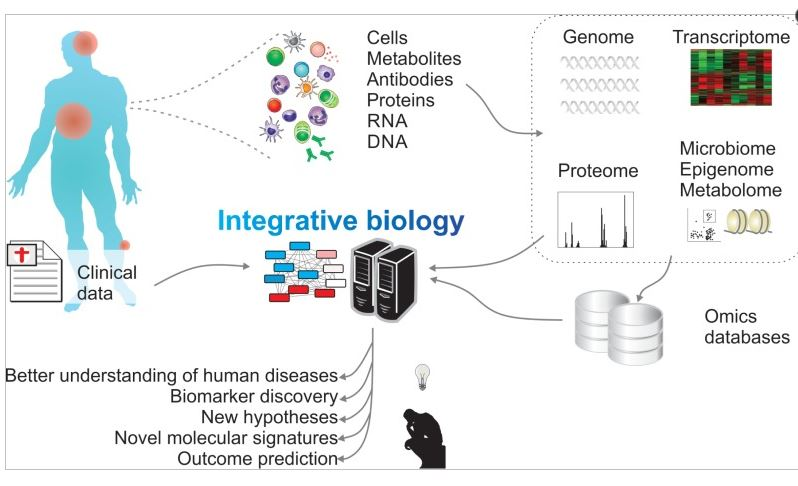Integrative Biology Approaches Applied to Human Diseases
The study of multifactorial and complex interactions in human diseases has been transformed by the omics revolution. The speed and scale of omics analysis have increased exponentially in the past decades, and it is now easier and faster to generate large amounts of biological data. However, extracting meaningful information from this “sea of data” remains a major challenge. The field of integrative biology utilizes a holistic approach to integrate multilayer biological data. In this chapter, we introduce concepts and techniques for the analysis of single-layer omics data and for integrating multilayer omics datasets to extract meaningful and relevant biological insights. Integrative biology is a promising approach for the study of a wide range of human diseases. We also highlight some current challenges in the field, such as the need for more specialized and interpretable methods, while increasing the accessibility of integrative analysis for the scientific community.
Authors
Alysson Urbanski; José Araujo; Rachel Creighton; Helder I Nakaya
External link
Publication Year
Publication Journal
Associeted Project
Integrative Biology
Lista de serviços
-
RASL11A, member of a novel small monomeric GTPase gene family, is down-regulated in prostate tumors.RASL11A, member of a novel small monomeric GTPase gene family, is down-regulated in prostate tumors.
-
Splice variants of TLE family genes and up-regulation of a TLE3 isoform in prostate tumors.Splice variants of TLE family genes and up-regulation of a TLE3 isoform in prostate tumors.
-
Concepts on Microarray Design for Genome and Transcriptome AnalysesConcepts on Microarray Design for Genome and Transcriptome Analyses
-
The iron stimulon of Xylella fastidiosa includes genes for type IV pilus and colicin V-like bacteriocins.The iron stimulon of Xylella fastidiosa includes genes for type IV pilus and colicin V-like bacteriocins.
-
Origins of the Xylella fastidiosa prophage-like regions and their impact in genome differentiation.Origins of the Xylella fastidiosa prophage-like regions and their impact in genome differentiation.
-
The role of prophage in plant-pathogenic bacteria.The role of prophage in plant-pathogenic bacteria.
-
Genetic control of immune response and susceptibility to infectious diseases.Genetic control of immune response and susceptibility to infectious diseases.
-
Building capacity for advances in tuberculosis research; proceedings of the third RePORT international meeting.Building capacity for advances in tuberculosis research; proceedings of the third RePORT international meeting.
-
São Paulo School of Advanced Sciences on Vaccines: an overview.São Paulo School of Advanced Sciences on Vaccines: an overview.
-
A reasonable request for true data sharing.A reasonable request for true data sharing.

